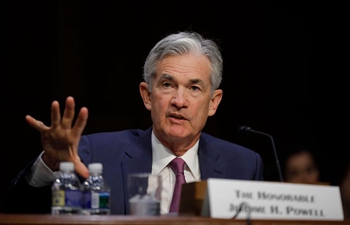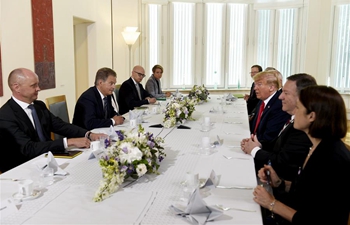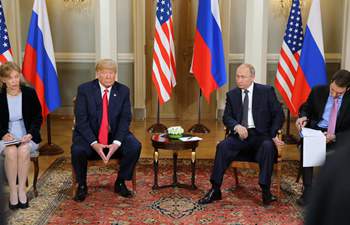WASHINGTON, July 18 (Xinhua) -- Christine Lagarde, managing director of the International Monetary Fund (IMF), Wednesday urged policymakers to develop multilateral solutions that will improve the global trade system.
"Trade tensions are already leaving a mark, but the extent of the damage depends on what policymakers do next," Lagarde wrote in a blog post, warning that escalating trade tensions could undermine global growth.
"If all currently announced tariffs go into effect, global output would be reduced by 0.1 percent in 2020. And if investor confidence is shaken by these tariffs, our simulation shows that the global GDP (gross domestic product) could decrease by 0.5 percent -- or roughly 430 billion U.S. dollars -- below the current projection for 2020," she said.
Lagarde's warning comes as finance ministers and central bank governors from the Group of 20 (G20) prepare to meet in Buenos Aires, Argentina, this weekend.
"Policymakers can use this G20 meeting to move past self-defeating tit-for-tat tariffs and instead develop multilateral solutions that will improve the global trading system," she said.
"Modernizing trade rules to address intellectual property rights and adopting innovative agreements on e-commerce and digital services should be at the center of trade discussions," said the IMF chief.
In a G20 Surveillance Note released by the IMF on Wednesday, the international financial institution reiterated that the global economy relies on "an open, fair, and rules-based international trade system."
"The United States should work constructively with its trading partners to end the ongoing tensions and to resolve trade and investment disagreements without resorting to the unilateral imposition of tariff or non-tariff barriers," said the note.
The United States has unilaterally imposed high tariffs on imported steel and aluminum products, provoking strong opposition from the domestic business community and retaliatory measures from U.S. trading partners.
"The risk that current trade tensions escalate further -- with adverse effects on confidence, asset prices, and investment -- is the greatest near-term threat to global growth," IMF chief economist Maurice Obstfeld said on Monday.













